Medicine Alphabet
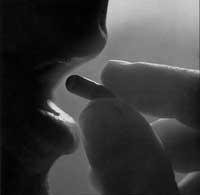
The National Institute of Consumer Affairs has published a pamphlet entitled “The Alphabet of Medicines”, which for its interest will be issued later in Basque. Keep in mind that the reader, the seminarian will not have the entire Spanish language. To see when they start thinking about Basque:
Do not self-medication with prescription medications.
The MEDICINE KIT should not have too many things at home: healing materials and only the medicines necessary to solve small accidents or mild health problems (burns, blows, wounds, pain or others) without going to the doctor.
Medicines should be stored in a cool, dry place (neither the kitchen nor the bathroom is the most suitable place), far from the reach of children, and it is necessary to periodically review the medicine kit to dispose of expired or damaged medicines.
Before USING, a new medicine should tell your doctor or pharmacist if you have any allergies, if you are taking another medicine, including those you buy and take on your own, if you have any illness or health problem, and finally if you are a woman, are pregnant, or are suspicious of it.
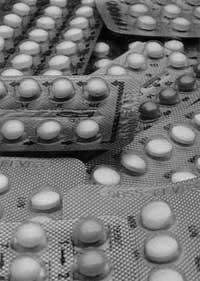
The beneficial action of medicines is usually accompanied by more or less annoying discomfort. These are called SIDE EFFECTS or side effects. Before starting treatment, you need to know what side effects may appear, how long they will last, what to do if they appear, and how to prevent them. In any case, if you have an unexpected reaction, you should tell your doctor or pharmacist.
The same drug can appear in different PHARMACEUTICAL FORMS: skin, external, application (ointments, creams, etc.) or verbal (pills, syrups, capsules, etc.) ), gluteus (suppositories) or even injection. Guidelines for each pharmaceutical form, dosage, etc. has different, that you have to know.
Medicines are best identified by their GENERIC name or by the active ingredient (as they appear in scientific books and journals). The brand or trade name is the name each lab gives to your pharmacy. Therefore, for the same generic name there may be several trademarks, but remember that the drug will be the same.
Abbreviation of the time. It is important that the patient respects the TOMAS (or SCHEDULE) of their medications to get the maximum benefit and avoid problems. In order not to forget the turn, or so that there are no errors, all this can be programmed with the help of graphics, indicating the time of day (with meals or when getting up from the bed, for example) to be taken, as well as the time between shifts.
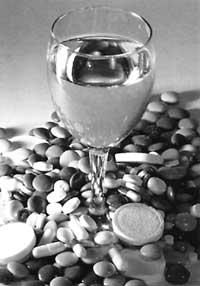
Medications may have INTERRELATIONSHIPS or MUTUAL EFFECTS with others, as well as with food or alcohol, increasing or decreasing their effectiveness, even causing harmful and unwanted effects.
Therefore, before you start using any medication, you should inform the pharmacist or doctor of the medications you are already taking, without forgetting the over-the-counter medications or medications taken for the spindles.
On the other hand, the DURATION of treatments is a point to be respected. It is not necessary to stop taking the medication because the patient begins to feel a little better, except for medical indication, since a poor recovery of treatment can prevent the complete cure of his disease, as with antibiotics. But treatment should not be extended longer without consulting the doctor.
Medicines are not a GAME. Children like it very much, because of its attractive color and shape and therefore it is quite common for accidents to occur in children. Explain to your children what medicines are and teach them to respect them.
Medication administration should be CAREFUL and CAREFUL, but special attention should be paid to pregnancy, lactation, people of childhood or advanced age, diabetes, hypertension or any type of patient allergy or liver or kidney deficiency.
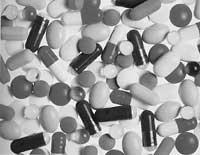
A medicine is not always a solution. It is often advisable to go to a NATURAL MEASURE: rest, drinking lots of water, eating more properly, quitting smoking, avoiding environmental risks, exercising, etc. So don't be surprised if your doctor doesn't recite anything.
It is very important to be clear if you should take your medicines at the time of meals (or immediately after meals) or that the stomach is empty (one hour before meals or two or three hours later). Because MEALS can interfere with the absorption of certain medications and therefore decrease their effectiveness. On the other hand, in some cases it may be necessary to take medicine with food or after eating to avoid gastric discomfort.
THE PRESCRIPTION is something personal, a form that indicates a certain medication for a person at a given time. Do not use your medicines with others, so do not think that another person (even if you have similar symptoms) should follow the same treatment, as only the doctor can assess the convenience of a treatment.
Know the SYMBOLS AND ACRONYMS that appear on drug labeling:
- Prescription: Or
- Only with special prescription drugs: l
- Refrigerated storage: Waste management
- Pharmaceutical advertising specialty: FPV
- Hospital specialty: M
- Specialty with hospital diagnosis ESO
- Specialty with special medical control: NDE
- Long-term treatment: TLD
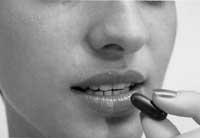
Some medicines accustom the body to its effects. This phenomenon is known as TOLERANCE (or TOLERANCE), so it is “customary” for the patient to use the medication continuously and to add doses to achieve the same effects as before (as with laxatives). In any case, if symptoms of tolerance are observed, tell your doctor that you will be offered another alternative. There may also be a dependence or dependence on a drug, such as the previous one, a dangerous use that must be repaired at the root.
Here the seminarian has finished, which as in other cases has remained quite lame or pathetic: some letters were missing, but in others more than one advice was lacking. But, well, like all sessions for didactic purposes, it has its advantages and it is better to address them than to constantly dig on possible errors or gaps.
Tips to keep in mind
- The most recent medicine is not always the most suitable or the best. In addition, the experience of using new drugs is often reduced, so its side effects are completely unknown and may increase the risks.
- If you miss any or more doses prescribed by the doctor, do not try to “compensate” the forgotten, taking them all together or committing some other type of setback. It is best to ask for advice on what to do in this situation, depending on the medication that is, since the solution may be different.
- Do not value the goodness of medicines based on price. Because the most expensive medicine does not have to be the most suitable at all times. This means that normally your technology is more complex or your research cost is higher, but these factors are not directly related to efficiency. Medicines, don't forget, are not articles or consumer items.





